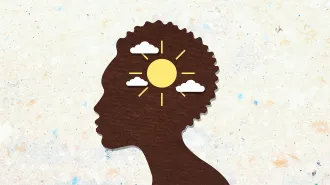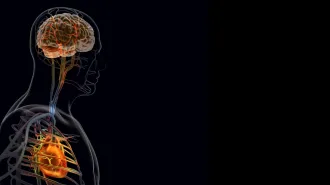Demystifying the Mind
A three-part series on the scientific struggle to explain the conscious self
|
Consciousness has posed a special challenge to scientists, but new ways of studying the brain may finally yield a deeper understanding. Science News describes the latest thinking on consciousness in this three-part special report. | Read essay and features. The human brain is very good at figuring things out, except about itself. Think about it. A brain capable of sophisticated reasoning has to be very complicated — so complicated that it would take an even more sophisticated brain to figure out how it works. But an even more sophisticated brain would be even harder to figure out. As the brain gets smarter and smarter, and thus more and more complex, it becomes ever more difficult to explain how it works. The brain can never catch up. Human brains are amazing devices, just not amazing enough to explain all of their amazing abilities. In truth, the human brain has figured out a lot about how it works. Much of the molecular and cellular machinery underlying thinking and learning and memory, and even emotion, has been outlined in elaborate detail. But dissecting the machinery has not enabled scientists to say why the machine has a persistent sense of itself, how it generates the feeling of self-awareness (and even the awareness of that self-awareness) that people generally refer to as consciousness. For millennia, philosophers have grappled with consciousness, trying to discern the distinction between mind and body or to show that such a distinction is illusory. But only in the present millennium have scientists engaged these arguments in a serious way, equipped with substantial scientific data. Science News neurocience writer Laura Sanders has explored the latest efforts by consciousness researchers to demystify the mind and reports her findings in a three-part series. Her account describes how consciousness, long regarded by neuroscientists as a taboo topic, has finally emerged as a legitimate realm of scientific inquiry. Research results have begun accumulating, and theorists have begun transforming explanations of consciousness from philosophical speculations into quantitative concepts and equations. A common thread connecting much consciousness theorizing is the role of information. Using the mathematics of information theory, scientists have begun to get a grip on possible ways of measuring consciousness, making it easier to identify and perhaps, someday, easier to create in a non-biological information-processing system. The prospect of a conscious computer may be terrifying to fans of the Terminator films (or, for older people, Colossus: The Forbin Project). But it would nevertheless be interesting to see if a conscious machine would be sufficiently sophisticated to figure out for itself how it works. —Tom Siegfried, Editor in Chief |
|
ESSAY: A strange loop emerges from the mind’s efforts to understand itself. |
|
FEATURE: The source of consciousness remains elusive, but the latest brain studies offer new insights. |
|
Consciousness emerges By Laura Sanders FEATURE: Conscious experience coalesces from sensory inputs traveling through the brain. |
|
In the March 10, 2012 issue FEATURE: Rich, deeply connected information may be the defining feature of consciousness. |







